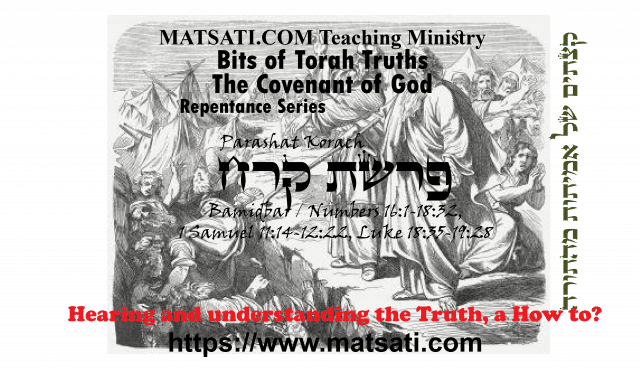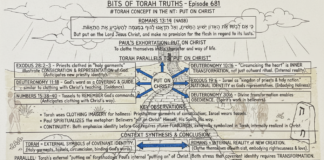In this week’s Torah portion we read the following, וישלח משה לקרא לדתן ולאבירם בני אליאב ויאמרו לא נעלה 16:12 Moses sent for Dathan and Abiram, sons of Eliab; but they said, “We will not come! המעט כי העליתנו מארץ זבת חלב ודבש להמיתנו במדבר כי־תשתרר עלינו גם־השתרר 16:13 Is it not enough that you brought us from a land flowing with milk and honey to have us die in the wilderness, that you would also lord it over us? אף לא אל־ארץ זבת חלב ודבש הביאתנו ותתן־לנו נחלת שדה וכרם העיני האנשים ההם תנקר לא נעלה 16:14 Even if you had brought us to a land flowing with milk and honey, and given us possession of fields and vineyards, should you gouge out those men’s eyes? We will not come!” ויחר למשה מאד ויאמר אל־יהוה אל־תפן אל־מנחתם לא חמור אחד מהם נשאתי ולא הרעתי את־אחד מהם 16:15 Moses was much aggrieved and he said to the LORD, “Pay no regard to their oblation. I have not taken the ass of any one of them, nor have I wronged any one of them.” Notice how these men respond to Moshe concerning his calling them to come and talk. Their response was that Egypt, the land of their bondage, was a land of milk and honey. The rabbis comment on these verses in the following way. Chizkuni on Bamidbar / Numbers 16:13 Part 1 state the following, “כי תשתרר עלינו גם השתרר, “but you have also imposed a dictatorship over us!” According to Rashbam, the Torah uses the word גם, usually translated as “also,” both positively and negatively, i.e. as a continuation of something previous, or as an abrupt opposite of something previously stated. Our verse is an example of Datan and Aviram using it in the latter sense as if asking: “are you now going to also (even) act as dictator? Shemot / Exodus 12:32 is such an example where the Pharaoh who had railed against Moses and Aaron all the time, suddenly makes a 180 degree turn by pleading for Moses to bless him also when offering sacrifices to the Jewish G-d. Bamidbar / Numbers 22:33, is another such example where the angel who had not killed anyone tells Bileam that he would have killed not only his ass but also Bileam if he had been at liberty to do so.” Note how the rabbis draw out the two-faced nature of Pharaoh, when it pleased him he asked Moshe to bless him. These people felt that Moshe and his brother were lording over them authority to rule over them as opposed to offering them God’s way for Teshuvah (repentance) which leads to freedom from sin, and the establishment of justice and truth, the basic needs of every individual on this earth. Babbeinu Bahya on Bamidbar / Numbers 13 Part 2 states that by the word “rule” the people meant that “Moshe was the political autocrat over the people and Aaron was the religious autocrat in his capacity as the High Priest.” Moshe had told the people “is it not enough that G’d has set you apart to become Levites, etc.” as referring to the “elevation” the lifting up of the people to a place of higher elevation. The rabbinic thought process follows as the Land of Canaan was situated higher in elevation than that of Egypt which was situated at sea level. The Lord God in heaven was drawing the people nearer to Himself by bringing them into the Promised Land. This is illustrated at this time the people were at a high plateau in the wilderness and the imagery that is given them is to the Lord lifting them up to heaven, raising them up to set them in a place of blessing even to having heard the voice of God and receiving His holy Words (mitzvot). The people on the other hand felt Eretz Yisrael was punishment and did not want the blessing of God. The people accused Moshe of bringing them to a place where all one could do was to die. Rashi’s explanation to this question is, “Perhaps we can say that Datan and Aviram did not want to justify their refusal to go and see Moses merely because he had brought them to a place where all one could do was die. They implied that even if all he had done was not to bring them to a land flowing with milk and honey this would be sufficient reason for them to decline his invitation as Moses had failed to deliver on his promise.” Remember that the people did not go straight up to the Land of Canaan but went into the wilderness to the Mountain of Sinai. They were working up to their next argument: “will you put out the eyes of these men?” Ibn Ezra interprets the verse as “do you want to gouge out the eyes of those men so that they cannot see” (what you are doing to them?) The subject of האנשים ההם are the people who had left Egypt, Datan and Aviram saying that these people had not been blind enough not to see how their lot had deteriorated under Moses’ rule. It is like someone saying about others: “these people must have their eyes shut, this is why they do not see.” The people are blaming Moshe for their own sin, “Is it not sufficient that you did us the evil of causing us to die in the desert, but even the good that you promised us you did not do.” It is significant to note that the Torah does not quote the people saying “we will not go,” or “we will not come,” but writes “we will not ascend, go up.” What this teaches us is that the people refused to ascend, to go up to the Lord, to draw near, and to pray. This is very important to us today as it is related to God’s Word. How often are we taught the law of God has passed away? The instructions (Torah) of God were given to cause us to ascend, to raise up, to draw near, and to have fellowship with God our Father in heaven. The Midrashic approach to these words of Datan and Aviram was that their mouth betrayed them as having refused to ascend, to go up, not simply to the Promised Land, or entering willingly into the blessing of God. Something more is as stake here. They refused God’s Word, they refused to walk in God’s ways, and by doing so they prepared the way of their destruction by going to die with their own tongues (the words they say). This is why the rabbis have so much to say concerning Lashon Hara (the evil tongue) and its connection to all other sins (idolatry, immorality, adultery, murder, selfishness, pride, covetousness, etc.). If we are not following in the footsteps of the Messiah Yeshua, we may mistake Egypt for a land flowing with milk and honey. The deception here is great, especially when one teaches that the divine commands are of no importance to us today. When we truely seek the walk in the footsteps of the Messiah, the truth and life that is found by faith in him will become a part of our lives to produce the fruit that God is looking for. Without faith in Yeshua the Messiah, and the empowering of God’s Spirit in our lives, it is impossible to produce the fruit God our Father is looking for. Do you have this kind of faith in Yeshua the Messiah?
Home Bits of Torah Truth Bits of Torah Truths, פרשת קרח, Parashat Korach, Hearing and understanding the...









